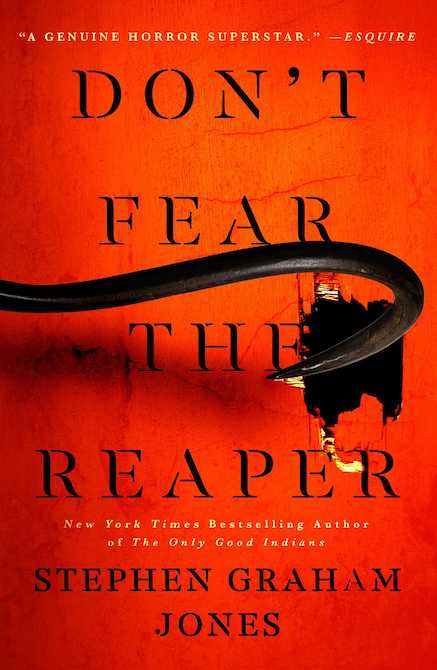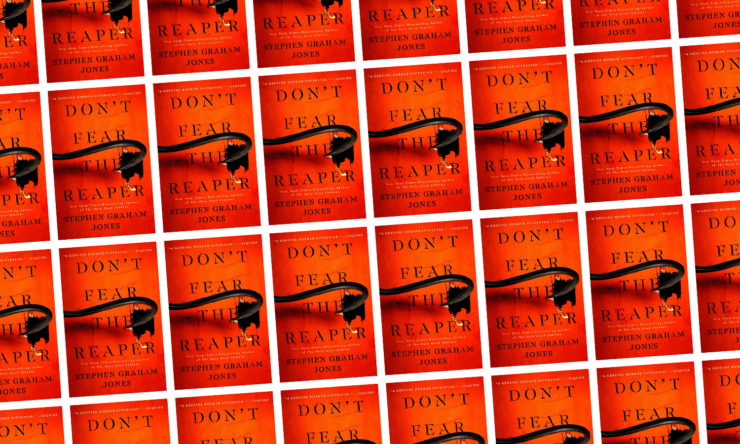Four years after the bloody events of My Heart is a Chainsaw, Jade Daniels is released from prison and returns to Proofrock just in time for the winter holidays. The community has, on the surface, started to recover from the Lake Witch Slayings. Four years means a full cohort of high school students graduating, passing down stories and rumors of the infamous class of 2015, while the original survivors have gotten married, had kids, been institutionalized, or left entirely.
However, Jennifer “Jade” Daniels isn’t the only one heading into town for Christmas. Notorious serial killer Dark Mill South is being transported through the Idaho mountains via convoy after his capture further west when a blizzard hits… freeing him right on their doorstep. His “reunion tour” carving through Proofrock begins on Thursday, December 12th and ends thirty-six hours later on Friday the 13th—but there’s more than meets the eye going on with Indian Lake’s second slasher cycle.
Everyone knows I adored My Heart is a Chainsaw, the first book in Stephen Graham Jones’ Indian Lake Trilogy, but I had assumed it would be a standalone. So, imagine my delight when I saw Don’t Fear the Reaper announced! “Middle books” in trilogies sometimes suffer from tonal unevenness or odd pacing, but Jones has none of those troubles. For one thing, his overarching concern with the psychic impacts of trauma—whether the splatter damage of a slasher spree or the mundane brutality of domestic abuse and sexual violence—allows the novel room to explore the changes within people’s lives after the events of the first book. There are no reset buttons; everyone carries their damage forward alongside their hopes and dreams. Also, Jennifer-slash-Jade returning from prison gives the reader a perspective that is both familiar and unfamiliar with Proofrock. It’s her hometown, sure, but she’s been gone four years.
Naturally she’s missing a lot of important information.
Buy the Book


Don’t Fear the Reaper
At the start of Don’t Fear the Reaper, I was certainly curious how Jones could return to the core premise of the first novel—Jade’s knowledge of slasher films structuring the plot. In the tradition of the genre: you can’t play the same trick twice and expect similar effects. For better or worse, horror stories often rely on novelty to kick the heartrate up and provoke emotion in the audience. I shouldn’t have entertained even a moment of doubt, though. The structural references here, delivered both as chapter titles and in the interspersed essays on “Slasher 102” (written by Gal, the youngest survivor of the original massacre who’s now in high school), are a mixture of old and new movies. And there are significant gaps in Jade’s previously encyclopedic knowledge… which revolve around the highly meta nature of the “new” slasher cycle, for example It Follows.
Some spoilers follow.
The phrase “know your genre” takes on a whole new heft as the millennium continues well past Scream. Jones’s plot, too, is layered and recursive. He weaves the tale complexly through its final girls, its survivors, and its killer(s) with red herrings and misdirections aplenty. After the original massacre, survivor Letha got into slasher flicks too—and other folks, from the new history teacher Mr. Armitage to the fresh crop of highschoolers to Dark Mill South himself, are also well-versed in the “rules.” Surviving the second cycle requires thinking more than two steps ahead, since everyone knows the tropes now and is aiming to subvert them. Whether a brief glimpse through the eyes of one gay high school boy or long sprints narrated by Jade, the deftness with which Jones flicks between perspectives throughout the novel keeps the reader unsettled and grasping after clues in a way that’s compulsively readable as much as it is… emotionally disruptive.
After all, it’s a slasher. Plenty of good people die and some shitty ones, against the odds, live.
On that note, Don’t Fear the Reaper also powerfully expands on some of the core themes of My Heart is a Chainsaw regarding community—especially the care adults owe to the young people in their midst—relationships, and survival. Jones writes about both the mundane and the extraordinary dangers faced by girls and women (but, also, queer boys and people of color and Indigenous people and poor folks and so on) with compassion, clarity, and a righteous anger that I find exceptionally refreshing in the horror genre. His books entertain, terrify, upset, and gross out the audience… while at the same time offering strong arguments about the responsibilities people bear for one another in building safer worlds.
Near the conclusion of the novel, as Jade struggles to haul an injured Letha across a frozen lake, she thinks to herself about how her ancestors could’ve withstood the vicious cold:
They pushed through. They insisted. They fought.
Fifty thousand ancestors, going back and back, each of them a final girl.
But, that’s just it, isn’t it? They were plural, not singular, that’s where horror movies have it all wrong, that’s where the slasher lies: it’s not about a lone girl carving her way to daylight, is it?
It’s about two girls making it across the ice together.
It’s not fifty thousand ancestors in a single-file line, it’s clumps of survivors fighting off saber tooth cats and dire wolves and other clumps of people.
It’s about putting the children and the old people in the middle and then making a circle around them, pointing out with every spear and shaking your head no, saying not this day.
Not this day.
I got teary-eyed reading that section. The powerful friendship between Letha and Jade throughout the novel struck me, as it still feels rare to see so much energy invested in platonic love connections between grown women. Jones demonstrates well how many different kinds of relationships are necessary to sustain communities. For example, Letha has a husband and a child, and those are hugely motivating factors for her—but so is Jade. And her baby daughter is cared for by several people throughout the novel while she’s out hunting down a serial murderer alongside her best friend. Hardy stands as both mentor and father-figure once again for Jade, and the scene where the pair of them share cigarettes sitting on the bench dedicated to his dead daughter made me cry (again!) just as much as the final moments between them and the spirit elk.
The constancy of how Jones writes through sociopolitical hierarchies, particularly complex intersectional power dynamics, never wanes either. There are bad men and good men in Don’t Fear the Reaper, and though the novel largely focuses on women—for example, on girls like Gal seeking role models in women like Jade and Letha for inspiration and guidance—one of the underlying themes is certainly masculinity. And, more than just masculinity, what men owe to their communities and to the people around them specifically. Within the slasher genre, and the world around us, there is a real value in attending to the ways masculinity “goes wrong” with awful, abusive men like Armitage or the town doctor or the school janitor… but also the ways it “goes right,” as much as possible and through engaged effort, with men like Hardy.
Overall, Don’t Fear the Reaper knocks it out of the park both as a standalone novel and as the second within a trilogy. Stephen Graham Jones has given readers a book that is at once a gory and terrifying page-turner; a clever meta riff on “new” slasher cycle genre tropes; and a thoughtful treatise on communities, relationships, and trauma survival. Can’t wait (but am also scared!) to see Jade Daniels and companies’ third cycle, in the forthcoming final book.
Don’t Fear the Reaper is published by Gallery/Saga Press.
Read an excerpt.
Lee Mandelo (he/they) is a writer, critic, and occasional editor whose fields of interest include speculative and queer fiction–especially where the two coincide. Summer Sons, their spooky gay debut novel, was recently published by Tordotcom, with other stories featuring in magazines like Uncanny and Nightmare. Aside from a brief stint overseas, Lee has spent their life ranging across Kentucky, currently living in Lexington and pursuing a PhD in Gender Studies at the University of Kentucky.










